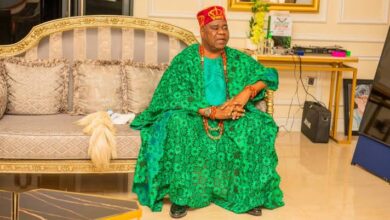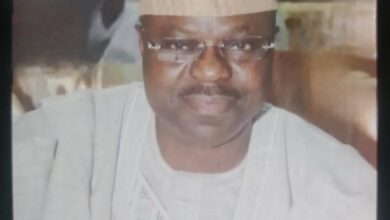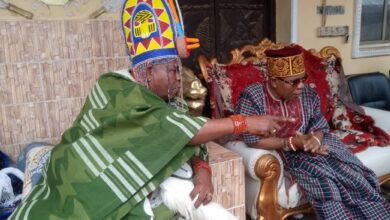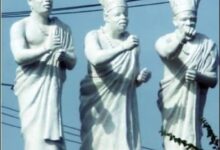fLASHBACk: A Peep into Oyo Empire: The Alaafin and his 100 court cases (2014)
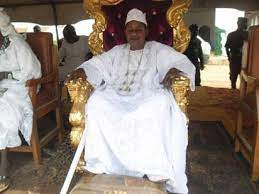
•‘The first 25 of 43 years on the throne was hectic’
By BASHIR ADEFAKA
Oba Lamidi Olayiwola Adeyemi III, Iku Baba Yeye, on Wednesday, January 14, 2014, clocked 43 years on the throne of the Alaafin of Oyo. How time flies! Time has moved at such a fast pace that one of the Yoruba most revered traditional rulers, during an interaction with Sunday Vanguard, could not understand how the feat of two scores and three that he has been on the throne was achieved. He, however, was certain that, “It is God Almighty; not by my power or effort. I give glory to Him.”
Forty-three years of living with Yoruba’s richest cultures and traditions isn’t a joke. According to the monarch, being on the throne for this long has come with its challenges and achievements; regrets and consolations. All the same, to him, the achievements, consolations and satisfactions are more quantitatively speaking than the challenges, regrets and dis-satisfactions.
Strength resides in boldness and truthfulness – the Alaafin example:
Where others, despite their statuses as traditional rulers, are, wittingly or unwittingly, shying away from playing the guiding role to politicians in government or speaking against the wrongs by the high and mighty in the society, the sitting Alaafin, in 43 years as the custodian of cultures and traditions of the Yoruba race, has no only been heard loudly against those wrongs but ,also, he has won virtually all the cases he instituted in the course of getting those battles to a logical conclusion.
The titan of Oyo Empire believes in equity and social justice. Invariably, he said the feat was for the good of the leaders and the people. During the Sunday Vanguard’s visit to the Aafin Oyo, the monarch took a retrospective look at his 43 years on the stool and said, “I have spent the last 43 years on the throne as the Alaafin, to contribute my quota to the development of the traditional institution in Nigeria.
“In doing this, I have approached the courts with over 100 cases and all the decided cases, with due respect to members of the Bench, the Inner Silk and the Bar, I, as the Alaafin of Oyo, have never lost a case on traditional institution matters.” Though he admitted it was not an easy feat, doing all that amounted to his contribution to the traditional institution development both in Yoruba race and Nigeria as a whole.
“I am a stickler to the rule of law and this is informed by my conviction that if the rule of law is removed from our society, we shall be living in animal kingdom”.
On celebration day in Oyo,
Sunday Vanguard had kept a date with the Alaafin on a 24-Hour Report mission. Pinning Oba Adeyemi down to an interview, however, is not an easy task. Not even during an exceptionally crowded event like that of his 43rd anniversary in the palace premises. But given the nature of the Sunday Vanguard assignment, the 24-Hour Report, there was no cause for the Alaafin to shelve the meeting. Although the reporter needed not engage him in talking most of the time the assignment would last, the Alaafin spoke at intervals while the programmes of event went on.
And for a busy leader like him, no other day was better for an assignment of this nature than that historic day put together by the four local government areas under the jurisdiction of the revered king. In order not to fail the Oba, who, like former Oyo State Governor Rashidi Ladoja, is an unrepentant lover of Vanguard, this reporter, knowing there would not be flight from Sokoto to Lagos on Saturday, had told the Sultan of Sokoto, Alhaji Muhammad Sa’ad Abubakar III, who he had just interviewed, he would not sleep in town due to other pressing assignments.
The visit to the Sultan was without prior notice, yet the Africa’s fourth most influential monarch and Nigeria’s topmost traditional and religious leader gave his unexpected visitor the audience he required. And as soon as he left the Sultan palace, the Sunday Vanguard journalist left Sokoto by road at 4.30pm on Friday, January 17 to arrive Oyo 11am the following day, the day set aside for the celebration of Adeyemi’s celebration of the 43rd anniversary on the throne.
Once informed of the journalist’s arrival amidst the very crowded but well organized morning session of the anniversary event, the Alaafin said, “Let him come, let him come.” Homages were paid to the king from some distance to the throne. People would greet, “Kaabiyesi ooo!” And Oba Adeyemi would raise his right-fisted arm in acknowledgment. Soon it was turn of the reporter to greet the monarch.
On getting to the carpet laid in front of him, “Kaabiyesi sir,” I greeted like others. The Alaafin said, “Maa bo, maa bo” (meaning, come on, come on) and on moving near touching his knees on the high, gold-plated elegantly built royal seat, Oba Adeyemi started by jokingly, and loudly too, challenging me, “You don’t come to me all the times. Sugbon sa mio binu.
I see your hand all the times and I thank Vanguard and I appreciate you, too, my son.” Who would have expected that such a highly placed monarch would have the time, despite the tight nature of the event, to have an informal chat with the reporter? That, an aide of his, said is a show of the charismatic leadership that he represents.
On the event attended by more than one thousand people, though he wanted it a low-key affair, the Alaafin, clad in white attire with his usual eleti-aja cap of same colour to match, was flanked on the right by his Oloris, princesses, grandchildren and, to his left, by his princes, other Yoruba Obas, Oyo chiefs and dignitaries including palace assistants and security agents who formed a crescent behind him.
Despite the busy look of things, he told me, “We are here this morning for the prayer session. After this, we will go inside and I will have the time to sit down with you and we talk. And then we will return to this place at 3pm for the afternoon session which is the main event.”
Such treatment, by the Alaafin, of this reporter, as it has always been, again threw him (Sunday Vanguard) up to the recognition and reverence of many. The next thing was for even some of the security agents around to accord him the smoothness required to do his job within the palace without hitches.
The Alaafin dance
After the prayer session, it was drumming all through. The Oyo traditional songs were sung as the lead drummer stood in front of the king, looking straight into his eyes, drumming and singing to draw his interest, which he successfully did and the Alaafin danced like an under-30. The staggering dance of the monarch was one performance that everybody fell on top of another to catch a glimpse of.
Monarch donates
In appreciation of God’s mercy on him for the 43 years he has spent on throne and the unfettered support and loyalty displayed to him by his people, the Alaafin gave out cars. Seizing the Opportunity afforded him by the occasion, Oba Adeyemi, who had always expressed that he would spend his times building and not destroying the society, urged President Goodluck Jonathan to consolidate synergy on new ideas, perspectives and international best practices in confronting the diverse challenges posed by perceived and actual threats to national security in communities.
He gave the advice during the afternoon session of the anniversary. Describing traditional rulers as formidable barricades which reinforce peace and security of the nation, the paramount ruler noted with concern the insecurity in the country which he blamed on lack of confidence and synergy between security agencies and other stakeholders in the society, in areas of information generation and management.
He called for seamless synergy between traditional rulers, security agencies and government at all levels, to fashion a framework for collaboration on security, grassroots mobilization, advocacy and development, with the objective of ensuring stability at all times.
His words: “As custodians of traditions and values, we are the ones who keep peace in our rural areas and in the various local governments that constitute our various states. As Nigerians, we must respect our various religious and ethnic backgrounds, because it is God that brought us together under one country. Thus, when we understand one another, the security challenges bedevilling the country will be a thing of the past.”
To political office holders, the Alaafin seized the occasion to urge them to redouble efforts, with the fear of God, towards discharging their responsibilities to the people. He decried “intolerance, distrust, deteriorating state of trust among the political elite and parties. It is creating political tension in the country.” On the role of traditional rulers and a peep into the history of Oyo Empire, Oba Adeyemi called for the traditional institution to be included in the constitution, pointing out the historical disposition and status of traditional rulers, as custodians and sustainers of the cultural and traditional values of our peoples.
“Traditional rulers are also in dire need of first line charge in the allocation of funds to enhance operations and actualization of their natural mandates. As a way of checking some of the social problems in the country, they called for the establishment of vocational schools to teach youths basic ways of earning a living that are devoid of so much emphasis on paper qualification without corresponding quality for self-reliance, as is the case presently”, the Alaafin asserted, recalling that the first 25 years of his reign was tough and full of challenges, adding that he inherited an empty ,bushy palace but was able to turn it to Mecca and Vatican of all Yoruba through divine intervention.
The Alaafin’s advocacy for proper placement of the traditional institution dates back to Thursday August 9, 1984 when he delivered a paper at a forum in Ibadan, where he highlighted issues regarding the role of traditional rulers in Nigeria. The fresh call that the monarch made in this regard on the occasion has necessitated extracts from that paper he delivered to the meeting well attended by rulers from the North, the South-west and South-east at that time.
“Having spent inevitably this much time on a preamble which is very fundamental for clear presentation, I will now proceed to treat the relevant topic of the lecture titled, Role of Traditional Ruler in the Governance of Nigeria. “We really cannot understand the present without knowing a little of the past. Therefore we need to look into a bit of history. The reason for this is that well organized communities which either by cohesion or persuasion developed into autonomous states must have passed through the historical process already explained above. They operated their own system of Government, had their separate social structures and evolved particular traditions and customs.
Significant among them were the Oyo Empire, Benin Empire, Borno Empire and what could be rightly called Fulani Empire. Also existing simultaneously were small kingdoms operating alone or as a Federation. The British came, took over, and grouped the various Empires and Kingdoms into Northern and Southern protectorates and Colony of Lagos.
“In January, 1914, the two protectorates known as group of Provinces and the Colony of Lagos were amalgamated into one country known today as Nigeria. When the British assumed the control of Administration, they simply adopted the existing system of government and this they styled as Indirect Rule. This step became necessary because they met an excellent system of Administration.
Further more, they had no knowledge of the country; had no personnel and resources to establish an alternative system. Therefore, they decided to use the available local resources in manpower to govern. The system of Indirect Rule was just like the utilization of the traditional rulers – their age-long and well-tested apparatus of Administration to govern the country – in a system which had been tried in India.
The system remained in operation until we took over progressively the control of the administration in the country from early 1950s and finally in 1960, when we achieved our Independence. We can now see the need to examine the subject matter a bit beyond its scope. I will treat the subject briefly on regional basis taking first, with your indulgence, the Yoruba states.
Oyo Empire:
“This paper is not concerned with the establishment of the Empire, its growth, dwindling, and reconstruction. Suffice to state that Oyo Empire was founded by Oranmiyan, the direct descendant of Oduduwa. He assumed the title of Alaafin. The first capital of the Empire was sited at Old Oyo. The Empire was threatened by internal strives and external aggressions. Subsequently, the capital moved to the present Oyo, the seat of my reign today by Alaafin Atiba, the first ruler in the new capital.
The roles of governing were performed by the traditional title holders in the capital and yet others in the provincial towns and villages within the Empire.
“The structural opposition, central to Oyo politics, lay in a division of roles. On the one side, the Alaafin was head of the administrative and the executive arms of government, entrusted with the implementation of external policy by diplomacy or war, the management of markets, trade, the investigation and punishment of crimes, and the celebration of the principal annual rites in the State
Cults of the Yoruba gods and ancestors.
“On the other side, the Oyomesi, on the order of the Alaafin, raised the citizens army of Oyo, and the Bashorun commanded it. The cults were in the hands of free Oyo, and their titled priests ranked among subordinate officials of the Oyomesi who were themselves civil lords of the non-royal wards and who severally had some judicial control in them, adjudicating disputes between the component lineages and generally in matter where arbitration rather than punishment was the aim.
The Oyomesi could dissuade the Alaafin from embarking upon rash adventures. “These title holders and palace officials are divided into two major groups, each group consisting of various classes and order of importance.
They are the royal title holders and the nobility. The most important in the royal group are the “Fathers of the King” – Onashokun, Ona-Aka, and Omo-Nla. These are heads of the three Principal Branches of the royal lineages barred from putting forward successors to the throne.
They are heads of town wards and have the responsibility to nominate the candidates to fill vacancy of Alaafin when it becomes necessary. Next to them, in that group are those referred to as the “brothers of the King”; namely: the Baba Iyaji, Olusami, Arole Oba, Atingisi, Agunpopo and Arole Iya-Oba. Others are the palace officials consisting of (a) titled officers, (b) the Eunuchs and (c) the Ilaris. Significant among this group are the Eunuchs also called Iwefa. The three leading members – Ona-Efa (eunuch of the middle), Otunefa (eunuch of the right), Osiefa (eunuch of the left), head the judicial, religion and executive divisions of the royal government respectively.
“The Oyomesi are the most important among the nobility. They are Bashorun, Agbaakin, Shamu, Alapinni, Lagunna, Akinniku, Ashipa and the Onamodeke. They are followed by the Eso (Military Officers) whose superior was the Aare-Ona-Kakanfo, the generallisimo of Yoruba Armed Forces. He resided outside the capital. There were seventy (70) captains – ten each under a member of the Oyomesi – superintending a unit of guards. However, none was attached to the Onamo deke.
“Other notable class in the Nobility are the Ogbonis -Cult of the earth – whose members are drawn from the titled priests of other lineages. All members of Oyomesi are ex-officio members of the Cult though they cannot be Ogboni priests. The head of Ogboni Cult and Chief diviner had access to the Alaafin through a woman official and the Osiefa. In particular, their unanimous sanction was necessary in the case of Oyomesi rejecting the rule of the Alaafin who would be consequently be expected to go to sleep.
This was the process of checks and balances which made the rule of Alaafin a pure democracy, at the time before the British occupation between 1894-1898.
“Like in the capital, the Provincial administration followed the same in pattern with the Provincial Kings or Baale at the head of affairs and held themselves responsible to the Alaafin of Oyo and carrying out his orders. They had advisers as well.”
Adeyemi in the eyes of the people
Oyo State Governor Abiola Ajimobi, in a message on Adeyemi’s 43 years on the throne, described the Alaafin as a charismatic and visionary monarch.
“I felicitate with His Imperial Majesty, the Alaafin of Oyo, Oba Lamidi Adeyemi III, on the 43rd anniversary of his ascending the throne of his forefathers. During this period Kabiyesi, you have distinguished yourself as a charismatic and visionary monarch, while your reign has brought immense peace, not only to Oyo Kingdom but the entire Oyo State and Nigeria as a whole.
“You have also been a pillar of support to our administration and this has helped tremendously in the successes we have recorded so far since our assumption of office.
“It is our prayer, therefore, that God imbues you with more wisdom, knowledge and understanding to continue to be a source of blessing to your subjects and humanity in general,” Ajimobi said.
In her remarks during the event, the Speaker of Oyo State House of Asembly, Alhaja Monsurat Sunmonu, described the Alaafin as a pathfinder, whose reign had brought prosperity and tremendous progress to Oyo metropolis in particular and the state in general.
Also, speaking, Alaafin’s eldest son, Prince Tunde Adeyemi, a lawyer, acknowledged his father as a monarch with unequalled intellectual sagacity, who is fearless, courageous, a staunch advocate of social justice and an uncompromising ruler, whose contributions to the well -being of the downtrodden remain indelible.
The highlight of the low-keyed occasion was the donation of cars by the Alaafin to his wives, children, aides, age-long friend and retired Archbishop of Methodist Church, Nigeria, Most Reverend Ayo Ladigbolu.
The Alaafin, a former university chancellor, was born on October 15, 1938. He ascended the throne on January 15, 1970 to succeed Alaafin Gbadegesin Ladigbolu II, during the governorship of Colonel Robert Adeyinka Adebayo now retired major general.
That was after the civil war. His 75th birthday was shelved for the Eid-ul-Kabir celebration October 15, 2013. Since he emerged the Alaafin, the Iku Baba Yeye, as he is traditionally called, has held many notable positions and played major roles in the efforts at moving Nigeria forward.
He was, in 1975, included by the then Head of State, General Murtala Ramat Muhammed in his entourage to Hajj. He was Chancellor, Uthman Dan Fodio University, Sokoto between 1980 – 1992 and, in recognition of his commitment to the consolidation of Islam in Nigeria, President Ibrahim Badamosi Babangida, in 1990, appointed Adeyemi as Amir-ul-Hajj by the virtue of which he led the multitude of Nigerian pilgrims to Mecca. The Alaafin has also been committed to several moves towards ensuring Nigeria’s unity, harmony and development.
First published on Sunday January 26, 2014 in Vanguard


